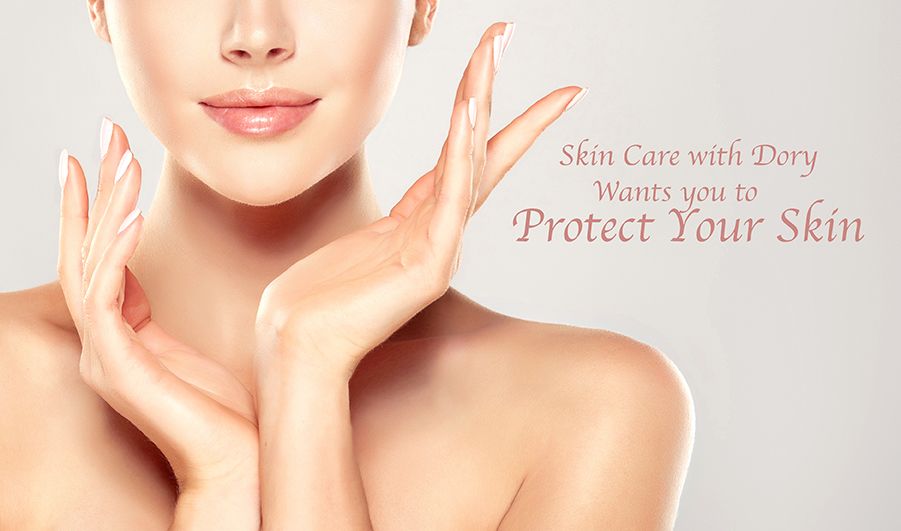YOUR SKIN IS YOUR LARGEST ORGAN – TREAT IT WITH SKIN CARE WITH DORY
It was not long ago that sun tanning was promoted as the vision of beauty and healthy vitality. We now know that sun exposure increases the risk of early aging, including wrinkles, dark spots, dry skin, and increased risk of skin cancers. While tanning lotions of the past are passé, the industry, bolstered by the knowledge of what promotes healthy skincare, has introduced a plethora of products to help us participate in our outdoor activities while protecting our skin from the harmful rays of the sun. With so many confusing options, how is one to choose the appropriate skin protection?
Mineral sunscreens – the future of skincare
Mineral (physical) sunscreens offer protection against both ultraviolet A (UVA) and ultraviolet B (UVB) rays and considered a “broad spectrum” solution. Application of mineral sunscreen provides immediate results and is suitable for sensitive skincare, and additional fragrances are not added, which are beneficial to those with sensitive skin. Mineral sunscreens use zinc oxide and or titanium dioxide in their ingredients.
Chemical sunscreens – let the buyer beware.
We also now are aware of considering and reading the labels of our food choices before consuming them. Similarly, if you can’t pronounce an ingredient on a sunscreen label, don’t purchase it.
While chemical sunscreens are the most common commercial sunscreens on the market, they contain toxic chemical filters and may erode the benefit of sunscreens. Chemical sunscreens can be harmful to the environment. They can have the potential risk of being endocrine and hence hormonal disruptors when applied in large amounts as it penetrates the skin.
Often, over-the-counter product manufacturers state “broad spectrum” on their label, but upon closer inspection, they may not clearly label that the product is chemically based. Look for active ingredients in fine print such as oxybenzone, avobenzone, octisalate, octocryule, and homosalate. The chemical sunscreen is thinner than mineral options and spreads more easily on the skin. Because the chemicals heat on the skin, brown spots may increase in visibility after sun exposure. Chemical sunscreens are not advised for dry or sensitive skin as the moisture barrier is thin.
Sun Protection Factors (SPF) defined
Sunscreen protects the skin from the harmful ultraviolet radiation from the sun – prolonging the time a person can spend outside without getting sunburned. An SPF rating is related to UVB rays. SPF 15 blocks about 94% of UVB rays; an SPF 30 rating product blocks 97% of UVB rays, and an SPF 45 product blocks about 98% of the UVB rays. Select a product that offers broad-spectrum UVA and UVB. You need protection when driving in your car as the glass windshield does not protect from UVA exposure. This is the reason that some have dark spots or freckles on one side of the face or the hands.
Dermatologists recommend selecting an SPF 30 higher. Always choose a sunscreen that is labeled “broad-spectrum,” which indicates the product has been tested to make a claim. Remember, ‘water-resistant’ does not mean “waterproof.”
If you want to maintain a truly healthy glow, always wear sunscreen when exposed to the sun (even in the shade) and try to stay out of the direct sun to maintain your youthful complexion. Always limit your time in the sun, especially during peak hours from 10 am to 2 pm. For further protection, wear long-sleeved shirts, pants, hats, and sunglasses. Also, remember in Colorado’s high altitude climate, reflective surfaces such as concrete, sand, snow, and water reflect 85% to 90% of the sun’s UV rays.
Skin Care with Dory’s recommendations:
For those who live in dry or windy climates, Skin Care with Dory offers a perfect daily application of Sunscreen for your unique skin type with a choice of a sheer or matte finish, tinted or non-tinted options. Ingredients include green tea extract and antioxidants to benefit and soothe the skin. They will help your skin maintain its suppleness and glow and to decrease the risk of premature aging skin and protection from harmful elements.
Our three recommended products for your unique skin concerns.
- Antioxidant SPF 33 has 97% filtration for UVA and UVB broad-spectrum rays and is hydrating and lightweight. It is useful for those who are concerned about acne flairs and want dewy moisture. It does not contain a tint.
- The SPF 45 sunscreen has a 97.5% filtration, is tinted, and perfect to even-out skin tones with the added benefit as an alternative to those who enjoy applying a light foundation.
- Protect SPF 30 for long last broad spectrum sheer coverage: Great for Men.
Remember, effective absorption takes approximately 20 minutes, and as with all sunscreen products, should be reapplied every 80 minutes when exposed to the sun. It is recommended that sunscreen should be reapplied every 2 hours for long-term sun exposure or for those participating in water sport activities or outdoor activities that cause sweating.
